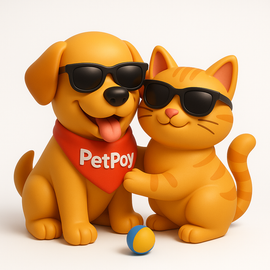The Importance of Nutrition for Your Beloved Pets
Frequently Asked Questions
1. Why is nutrition important for pets?
2. What are the essential nutrients pets need?
3. How can I choose the right pet food?
4. What are common myths about pet nutrition?
5. Is homemade pet food a good idea?
As pet owners, one of our foremost responsibilities is to understand and provide for the nutritional needs of our furry friends. Proper nutrition is as crucial for pets as it is for humans. A balanced diet not only supports their physical health but also contributes to their emotional well-being. In this article, we will delve deep into the importance of nutrition for pets and how it influences their overall quality of life.
Understanding Pet Nutrition Basics
Just like our nutritional needs vary as we grow, so do our pets'. Whether you’re caring for a playful puppy, a curious kitten, a loyal dog, or an affectionate cat, it is vital to understand their unique dietary requirements.
Essential Nutrients for Pets
Pets require a variety of nutrients for optimal health. Here are some essential components:
- Proteins: Critical for muscle development, growth, and tissue repair.
- Fats: Provide energy and help with vitamin absorption.
- Carbohydrates: While not essential, they supply energy and aid digestive health.
- Vitamins and Minerals: Crucial for metabolic functions and maintaining immune health.
- Water: Often overlooked, but critical for all bodily functions.
Each nutrient plays a specific role in keeping pets healthy, active, and vibrant. Selecting the right combination, appropriate to your pet’s age, breed, size, and lifestyle, is vital for ensuring a long, healthy life.
The Link Between Nutrition and Wellness
Providing your pet with balanced nutrition leads to numerous health benefits, including:
- Improved immunity and resistance to diseases.
- Healthier skin and shinier coats.
- Enhanced energy levels and activity.
- Better digestion and nutrient absorption.
- Longer lifespan and a happier pet.
Without proper nutrition, pets can face serious health issues, including obesity, diabetes, and heart disease. Being mindful of your pet's dietary habits can make a world of difference.
Choosing the Right Pet Food
The market is flooded with pet food options, from dry kibble to wet food choices. As a pet parent, you might feel overwhelmed. Here are practical tips for choosing the right pet food:
Read the Ingredients List
Look for high-quality protein sources as the first ingredient. Avoid pet foods with fillers like corn and soy. Instead, opt for those rich in whole foods that list meat, vegetables, and grains.
Avoid Artificial Additives
Steer clear of pet foods with artificial colors, flavors, and preservatives. Natural ingredients are always better for your pet's health.
Consider Age and Breed
Different pets have different dietary requirements based on their age and breed. Puppies and kittens need food that supports growth, while older pets might require diets that focus on joint health and digestion.
Common Pet Nutritional Myths
As a responsible pet owner, it’s essential to separate fact from fiction regarding pet nutrition. Here are some common myths:
Myth 1: Dogs Are Carnivores
While dogs share a lineage with wolves, they are omnivores and thrive on a balanced diet that includes plant-based ingredients along with meat.
Myth 2: Grain-Free is Always Better
Grain-free diets can be beneficial for pets with specific allergies or sensitivities, but many dogs and cats can digest grains without issues. Always consult with a vet when considering diet changes.
Myth 3: Human Food is Safe for Pets
Not all human food is suitable for pets. Certain items like onions, chocolate, and grapes can be toxic. Always research before sharing your meals with your furry friend.
Homemade Pet Food: Is It Worth It?
Some pet owners choose to prepare homemade meals to ensure their pets receive the best nutrition possible. While this approach can be beneficial if done correctly, it also comes with risks:
Benefits of Homemade Pet Food
- You can control the quality of ingredients.
- There’s flexibility to accommodate allergies or dietary restrictions.
Risks of Homemade Pet Food
- It can lead to imbalances if not carefully planned.
- Homemade diets may lack essential nutrients, risking your pet’s health.
If considering homemade pet food, consulting with a veterinary nutritionist ensures your pet gets a balanced diet tailored to their needs.
Staying Consistent with Feeding
Feeding routines contribute significantly to your pet’s health. Here are some tips for optimal feeding consistency:
Portion Control
Feed your pet the correct portions as recommended on their food packaging or as advised by your veterinarian. Overfeeding can lead to obesity, while underfeeding may result in malnutrition.
Regular Feeding Schedule
Establish and maintain a consistent feeding schedule. Most dogs thrive on two meals per day, while cats typically prefer smaller meals throughout the day.
The Role of Supplements
Many pets might benefit from dietary supplements, especially if they have specific health concerns. Common supplements include:
- Omega fatty acids for skin and coat health.
- Glucosamine for joint support.
- Probiotics for digestive health.
Before introducing any supplements to your pet’s diet, it's essential to consult with your veterinarian to determine what’s best for them.
Pet Supplies: Supporting Nutrition
Beyond food, various pet supplies play an important role in supporting optimal nutrition. Here are some must-have items:
- Food and Water Bowls: Ensure they are the right size to avoid strain during mealtime.
- Storage Containers: Keep pet food fresh and uncontaminated by pests.
- Appetite Stimulating Toys: This can make mealtimes enjoyable and encourage good eating habits.
Final Thoughts on Enhancing Your Pet’s Life Through Nutrition
The significance of nutrition in a pet's life cannot be overstated. From maintaining their healthy weight to ensuring a shiny coat and robust immune system, every aspect of your pet's health is influenced by what they eat. By educating yourself about their dietary needs and investing in quality food, you pave the way for a healthier, happier companion. It’s a rewarding journey where the love we give is reciprocated multifold by our loyal friends. Remember, a well-nourished pet is a content pet, and your efforts today will pay off in a lifetime of joy and companionship.



